
A tuna is a saltwater fish that belongs to the tribe Thunnini, a subgrouping of the Scombridae (mackerel) family. The Thunnini comprise 17 species across five genera, the sizes of which vary greatly, ranging from the bullet tuna up to the Atlantic bluefin tuna, which averages 2 m (6.6 ft) and is believed to live up to 50 years.

Katsuobushi is simmered, smoked and fermented skipjack tuna. It is also known as bonito flakes or broadly as okaka (おかか).
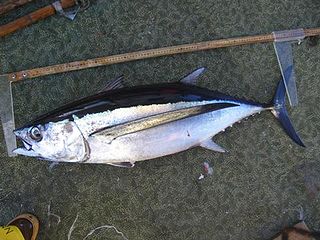
The albacore, known also as the longfin tuna, is a species of tuna of the order Scombriformes. It is found in temperate and tropical waters across the globe in the epipelagic and mesopelagic zones. There are six distinct stocks known globally in the Atlantic, Pacific, and Indian oceans, as well as the Mediterranean Sea. The albacore has an elongate, fusiform body with a conical snout, large eyes, and remarkably long pectoral fins. Its body is a deep blue dorsally and shades of silvery white ventrally. Individuals can reach up to 1.4 m in length.
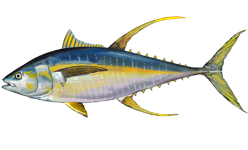
The yellowfin tuna is a species of tuna found in pelagic waters of tropical and subtropical oceans worldwide.
Industries in the Maldives center around fishing and tourism, with some overlap between the two with recreational fishing.
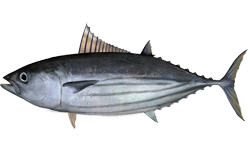
The skipjack tuna is a perciform fish in the tuna family, Scombridae, and is the only member of the genus Katsuwonus. It is also known as katsuo, arctic bonito, mushmouth, oceanic bonito, striped tuna or victor fish. It grows up to 1 m (3 ft) in length. It is a cosmopolitan pelagic fish found in tropical and warm-temperate waters. It is a very important species for fisheries. It is also the namesake of the USS Skipjack.
Felivaru Fisheries Maldives (FFM) is a company owned by the government of Maldives. It produces canned tuna and cooked fish for local and export markets.

Poke is a dish of diced raw fish tossed in sauce and served either as an appetizer or a main course.

Fresh fish rapidly deteriorates unless some way can be found to preserve it. Drying is a method of food preservation that works by removing water from the food, which inhibits the growth of microorganisms. Open air drying using sun and wind has been practiced since ancient times to preserve food. Water is usually removed by evaporation but, in the case of freeze-drying, food is first frozen and then the water is removed by sublimation. Bacteria, yeasts and molds need the water in the food to grow, and drying effectively prevents them from surviving in the food.

Maldives fish is cured tuna traditionally produced in Maldives. It is a staple of the Maldivian cuisine, Sri Lankan cuisine, and the cuisine of the Southern Indian states and territories of Lakshadweep, Kerala and Tamil Nadu, and in the past it was one of the main exports from Maldives to Sri Lanka, where it is known as umbalakaḍa (උම්බලකඩ) in Sinhala and masikaruvadu in Tamil. It is also produced in small scale using traditional methods in Lakshadweep Islands in India. It is known as massmin in Lakshadweep.

Maldivian cuisine, also called Dhivehi cuisine, is the cuisine of the Republic of Maldives. The traditional cuisine of Maldivians is based on three main items and their derivatives: coconuts, fish and starches.

The term fish processing refers to the processes associated with fish and fish products between the time fish are caught or harvested, and the time the final product is delivered to the customer. Although the term refers specifically to fish, in practice it is extended to cover any aquatic organisms harvested for commercial purposes, whether caught in wild fisheries or harvested from aquaculture or fish farming.

A factory ship, also known as a fish processing vessel, is a large ocean-going vessel with extensive on-board facilities for processing and freezing caught fish or whales. Modern factory ships are automated and enlarged versions of the earlier whalers, and their use for fishing has grown dramatically. Some factory ships are equipped to serve as a mother ship.
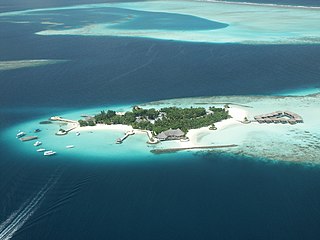
The fishing industry in the Maldives is the island's second main industry. According to national tradition in the words of former President Maumoon Abdul Gayoom, "Fishing is the lifeblood of our nation, it is inborn. From the soil on which we live, to the sea around us, it remains an integral part of our existence. Fishing, and our country and its people, [are] one and shall remain inseparable forever." The Maldives has an abundance of aquatic life and species of fish. Common are tuna, groupers, dolphin fish, barracuda, rainbow runner, trevally and squirrelfish and many more. Aside from being of essential importance to the economy, fishing is also a popular recreational activity in the Maldives, not only among locals but by tourists. The islands have numerous fishing resorts which cater for these activities.
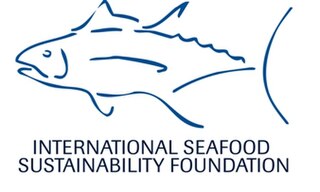
International Seafood Sustainability Foundation (ISSF) was formed in 2009 as a global, non-profit partnership among the tuna industry, scientists and World Wide Fund for Nature. The multistakeholder group states its mission is "to undertake science-based initiatives for the long-term conservation and sustainable use of tuna stocks, reducing bycatch and promoting ecosystem health". Regional Fisheries Management Organizations (RFMOs) are primarily responsible for managing the world's tuna stocks—skipjack, yellowfin and albacore tuna, the species most commonly processed for canned and shelf-stable tuna products, but their parliamentary procedures too often allow the short-term economic and political interests of nations to prevent sustainable measures from being adopted. ISSF works to ensure that effective international management practices are in place to maintain the health of all the tuna stocks.
A fish company is a company which specializes in the processing of fish products. Fish that are processed by a fish company include cod, hake, haddock, tuna, herring, mackerel, salmon and pollock.

Sardines ("pilchards") are a nutrient-rich, small, oily fish widely consumed by humans and as forage fish by larger fish species, seabirds and marine mammals. Sardines are a source of omega-3 fatty acids. Sardines are often served in cans, but can also be eaten grilled, pickled, or smoked when fresh.

Canned or tinned fish are food fish which have been processed, sealed in an airtight container such as a sealed tin can, and subjected to heat. Canning is a method of preserving food, and provides a typical shelf life ranging from one to five years. They are usually opened via a can opener, but sometimes have a pull-tab so that they can be opened by hand. In the past it was common for many cans to have a key that would be turned to peel the lid of the tin off; most predominately sardines, among others.















